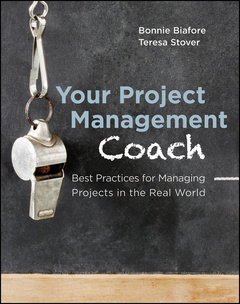Your project management coach: best practices for managing projects in the real world (paperback) Best Practices for Managing Projects in the Real World
Auteurs : Biafore Bonnie, Stover Teresa

If you manage projects, meet your coach!
Many projects fail to deliver "on time and within budget."?These failures are often the result of poor project management skills. Your Project Management Coach provides a hands-on, pragmatic approach to solving real-world project management problems. Using richly illustrated case examples, the authors show how to apply proven project management techniques to achieve optimum results. The companion website provides forms and templates you can use to put the ideas in the book into action. Whether you"re an experienced project manager looking for specific solutions or are new to project management, you"ll find a gold mine of practical, field-tested advice.
What you will learn
Elements that define a project, including the problem, goal, objectives, and success criteria
How to plan a project, including how to identify and estimate the work and cost
Best practices for building a realistic schedule, using work estimates, resource availability, and more
How to manage quality, risk, and change
Techniques for evaluating progress and performance
Methods for balancing scope, time, and cost, as well as resources, quality, and risk
Why you want to document lessons learned and archive project information
When your organization needs a project management office or project portfolio management
You can also use this book to assist in your preparation for the PMP Certification Exam.
Visit to find sample project management documents, a link to the authors" blog, and more
Part I Understanding Projects and Project Management 1
Chapter 1 Getting to Know Projects 3
What Is a Project? 3
A Project Is a Unique Endeavor 5
A Project Has Clearly Defined Objectives and Deliverables 5
A Project Has a Beginning and an End 7
A Project Usually Has a Budget 8
How Do Projects Differ from Other Work? 9
Summary 10
Coach's Review 10
Test Your Knowledge 10
Project Challenge 10
Chapter 2 Getting to Know Project Management 11
What Is Project Management? 12
Project Management Processes: Start to Finish 13
Initiating a Project 14
Planning a Project 15
Executing a Project 17
Monitoring and Controlling a Project 18
Closing a Project 19
Balancing Scope, Time, Cost, and Quality 20
Project Management Methodologies 21
Traditional Waterfall Project Management 21
Iterative and Agile Project Management 22
Project Management Knowledge Areas 23
Scope Management 24
Time Management 25
Cost Management 25
Human Resource Management 25
Procurement Management 26
Communication Management 26
Quality Management 26
Risk Management 27
Integration Management 27
Who Makes a Good Project Manager? 28
Business Savvy 28
Technical Skills 28
Soft Skills 29
Varying Viewpoints 29
Delegating 30
Leadership and Interpersonal Skills 30
Flexibility 30
Doing the Right Things for the Project 30
Summary 30
Coach's Review 31
Test Your Knowledge 31
Project Challenge 31
Part II Planning a Project 33
Chapter 3 Getting a Project Off the Ground 35
From Idea to Project: An Overview of
Project Initiation 36
Defi ning a Project 37
Discovering the Problem or Opportunity 40
Articulating the Project Goal and Objectives 44
Developing the Project Goal 44
Creating the Project Objectives 45
Deciding on the Project Strategy 46
Brainstorming Possibilities 46
Identifying Constraints 47
Choosing the Right Strategy 48
Gathering Requirements 49
Starting with Broad Requirements 49
Mining for Requirements 49
Differentiating and Prioritizing Requirements 50
What Constitutes Success? 51
Documenting Project Scope 52
Elements of the Scope Statement 53
Controlling Scope Creep 55
Specifying the Deliverables 57
Identifying Risks, Assumptions, and Constraints 58
Working with Risks 58
Working with Assumptions 59
Working with Constraints 59
Identifying the Project Stakeholders 60
Preparing the Project Proposal 62
Getting Approval or Sign-Off 65
Publicizing the Project Charter 66
Preparing a Project Charter 67
Distributing the Project Charter 68
Assembling the Project Notebook 68
Using the Project Notebook for Approved Projects 69
Using the Project Notebook for Tabled or
Denied Projects 69
Choosing the Form of the Project Notebook 69
Summary 71
Coach's Review 71
Test Your Knowledge 71
Project Challenge 72
Chapter 4 Getting to Know a Project Plan 73
What Work Has to Be Done? 74
Identifying Work 74
Organizing Work into Major Categories 74
How Much Will the Project Cost? 75
Obtaining Early Cost Estimates 75
Building a Budget 75
Who Will Do the...
Bonnie Biafore is a PMI–certified project manager, as well as a trainer and award–winning author. She has written numerous books on project management, small business accounting, and other topics. Teresa Stover is a technical communications and project management consultant for software, manufacturing, and education. Both are prolific writers and conduct training on project management.
Date de parution : 02-2012
Ouvrage de 552 p.
18.5x23.1 cm
Disponible chez l'éditeur (délai d'approvisionnement : 12 jours).
Prix indicatif 49,14 €
Ajouter au panierThème d’Your project management coach: best practices for... :
Mots-clés :
books on PMP, book on PMP exam, books on project management, book on project management, PMP study guide, PMP, PMP exam, Project Management Professional, PMP prep guide, preparing to take the PMP, preparing for the PMP exam, domain areas of the PMP exam, project management on the job, managing projects, how to manage projects, project management coach, project management certification, project management training, project manager certification, project management tools, certificate in project ma
